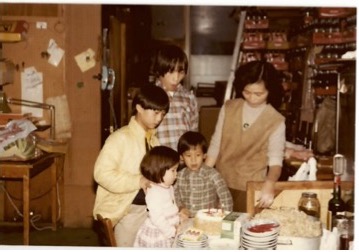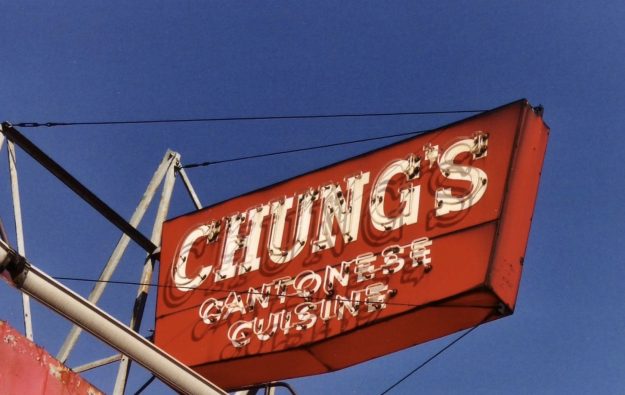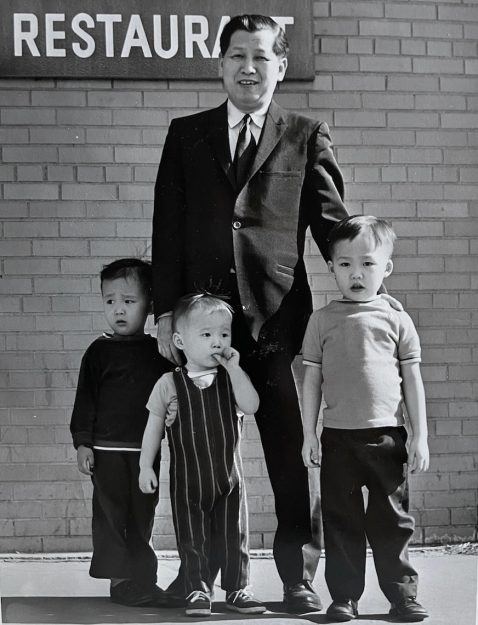YOUR CART
- No products in the cart.
Subtotal:
$0.00

Three weeks after the release of his debut memoir, Everything I Learned, I Learned in a Chinese Restaurant, Curtis Chin spoke to a packed auditorium at his alma mater, the University of Michigan. The crowd sat riveted by Chin’s stories of growing up in the tumult of 1980s Detroit with five siblings in a working-class family that ran the popular establishment Chung’s Cantonese Cuisine. In his multifaceted memoir, readers follow Chin from childhood through college as a restaurant kid and a budding writer. He grapples with everything from his sexuality and politics to his racial identity and poor cooking skills—all while being shaped by the AIDS epidemic, the murder of close family friend Vincent Chin, and the Buddhist family that raised him.
A filmmaker, writer, and cofounder of Asian American Writers’ Workshop, Curtis spoke to Tricycle from his home in Los Angeles. Despite the demands of being on the road for his forty-plus-city book tour, he’d been carving out time to make some radical changes to a screenplay project he was still working on. “I forget how fun it is to write,” he smiles. “I like meeting people, but there’s something about being by yourself and writing that is also really fun. It’s like meditation.” Chin took a break from his speaking engagements and reveling in the pleasure of writing to talk with Tricycle about home altars, TV buddhas, and the art of generating mahjong karma.
This interview has been edited for length and clarity.
*
One of the many moments of surprise and humor in your book was when you called your family ABCs—not for American Born Chinese but “Asian Buddhist Confucians.” A Google search tells me that you may have coined this term? That’s really interesting that nobody has used this term before. I use “Asian Buddhist Confucian” because I felt like you can’t really pinpoint these things. The cultural influences of each of them are like a Venn diagram, right? I can’t parse out my actions, or my thoughts, or my view of the world and say that’s strictly Buddhist, or that’s strictly Confucian, or that’s Asian. Maybe I should have also said it was American, because there are these American influences, as well. That’s the way I was raised, as this amalgam of all the cultural influences from my parents. I never formally studied Buddhism, because we didn’t really have a temple. I just picked it up. It’s more of a cultural category.
Almost like an Asian American Buddhist Confucianist. Yeah, exactly.
Early in the book, you write about how your Ngin-Ngin, the grandmother with whom you did not have the easiest relationship, “kept a small Buddhist altar by the ever-churning rice cooker. The most devout member of the family, she would burn her joss stick every morning and pray to Guan Yin, the goddess of compassion. But whenever I interrupted her chanting to ask what she was praying for, she would threaten to throw her prayer book at me.” Can you say more about how your Buddhist upbringing was shaped by your family? The most iconic thing in our house was the statue of Buddha right on top of our TV. We’d watch TV, and we’d see Buddha right there. My grandmother had her altar, and she did her rituals every day. I don’t know how much of this is Buddhist: going to the cemetery, doing ancestor worship—the cultural aspects, right? Like the foods we ate, how things were served, why certain sayings came about.
That’s how it had an influence on me growing up. It’s natural, it just comes up. We don’t have to name and categorize everything. It just is. It’s part of your being. You absorb it. The reader might say, Oh, that’s a very Buddhist way of approaching life. The biggest one is this idea of generating good karma, like what my mom said playing mahjong: you just have to keep building up small victories to get a big victory. Is that in some ways quasi-Buddhist?
I have to ask you about the Buddha statue on your TV. We had one at the restaurant too, but the one on our TV was a giant porcelain Buddha. We had other Asian statues too, like the eight immortals, and the four goddesses—are those Buddhist?
Did your grandmother make offerings to the statues? She did offerings every day, so I would observe her doing it. That’s how she started the day. Whenever we went to the early shift with her, it was the first thing she did before we opened up. She would say her prayer, light an incense stick. It didn’t last very long. It was just like turning on the rice cooker or starting the soup pot. Putting the food up for the altar was part of opening up the restaurant. It was a natural part of the day.
What language did your grandmother say her prayers in? Cantonese? Yeah, Cantonese. The starkest time I remember was actually when she did it out loud this one time. We were in the car, and it was a really rainy day. I was driving, and I had a really bad track record, but everybody else was tired from working. I was only 18 years old, and oh my god, it was an awful night. My grandmother was just in the back seat, chanting: hope we live hope we live hope we live. It’s terrible you’d put this extra pressure on me! [laughs] But incidents like that would just pop up in your life, you know?

Your book is a multistranded memoir about your journey of coming out as a gay man, of coming into a new political consciousness, of growing up as a restaurant kid and finding your footing as a writer and activist. Another thread that’s woven throughout, that I don’t think you’ve talked about as much in other interviews, is Buddhism. I spotted a couple of dozen Buddhist references from beginning to end, plus scenes and themes that struck me as Buddhist or Buddh-ish (or maybe I should say Asian American Buddhist Confucianist!). Did you consciously choose to stitch Buddhism into the fabric of this book during the writing process? I don’t know if I consciously tried to pick that out, much like with [socioeconomic] class. Those were harder to pinpoint than issues of race and sexual orientation: queerness, because it’s so much under attack; race, because it’s at the forefront in a city like Detroit.
When you’re an outsider when it comes to religion, when you’re Buddhist, you’re not part of those Judeo-Christian arguments that are going on. When they seem to be fighting, we’re sort of on the sidelines.
Maybe that’s why I didn’t necessarily feel this pressure to identify and claim a space as a Buddhist, versus with race and sexual orientation, you need to do that. At that age, I didn’t feel proud of being working class, because in America, there’s such a bias against working-class people. But as I get older, I embrace being from a working-class background much more. In our country, race and sexual orientation are much more volatile subjects than class. I think class should be a bigger issue, but it’s not.

You recognize in your memoir that being a gay, working-class person of color from a religious minority made you an outsider. Did you ever struggle with your identity as a religious minority, or were you comfortable being seen as Buddhist as you were growing up in 1980s Detroit? I don’t know if people really thought about it much. Maybe they assumed we were Christian. Being in a Chinese restaurant, religion did come up since we had a lot of Jewish customers. During the holiday season, we celebrated Hanukkah. We also put up a Christmas tree. We weren’t doing it to hide [being Buddhist], we were just celebrating Christmas like everybody else. But we also played with dreidels. I don’t think our Jewish customers assumed we were Jewish. I think in America, people have a tendency to default to thinking you’re Christian unless you say otherwise.
Our conversation has me thinking about the recent Pew Forum report on religions among Asian Americans. It found that among Asian Americans, 11 percent identify as Buddhist, but an additional 21% feel connected to Buddhism due to family or culture. Those are quite low numbers. Maybe because Buddhism doesn’t have a strict checklist, we don’t know how Buddhist we are, or how to be classified. Christians might define how Christian you are by the number of times you go to church, but Buddhists don’t necessarily do that. If more people understood the fluid nature of Buddhism, how personal and individual it is, maybe more of them would feel comfortable identifying as Buddhist?
The report reflects this. In the 2012 Pew Forum survey, they asked people how they went to church, but for this survey, they expanded to ask questions about home altars, honoring ancestors, and other practices that might happen outside a temple. So the numbers went up.
The numbers went up. Buddhists were more likely to tend to a home altar, for instance. I agree with that. Different religions approach how you practice and how you are part of the tribe differently. The time I was practicing most was when I moved to New York. I would go to temple every couple of months. I worked on the Lower East Side, and it was easy for me to go down to Chinatown. I could just swing by the temple and make a few prayers. Out here in Los Angeles, I don’t really travel around much because I hate driving. We’ve gone to the Hsi Lai Temple a few times; they have vegetarian Buddhist meals. My brother is probably the most practicing: he won’t eat meat, or even garlic or onions. He’s really hard-core, so when we’re with him, we have to practice it a bit more.
There’s a passage in your memoir where you write, “Thanks to the Buddhist side of my upbringing, anger was not an emotion I was comfortable with. I’d always been told to let go, find compassion, and preach nonviolence.” Can you say more about how—or if—you were able to reconcile your anger with your Buddhist upbringing? I struggle with that even now. I want to forgive. I want to find out why people do certain things and try to understand and have compassion. But does coming to an understanding mean you should absolve it? Is it OK for them to do the things that they do? That’s my struggle. How to be nonconfrontational in a society that’s so confrontational and divisive?
America is a very black-and-white, good-versus-evil society. I think some of this comes from monotheistic religions preaching the idea of the good versus evil as if they were two separate things. I find that to be very problematic. I can’t remember if I jokingly said this in the book, that democracy requires more Buddhists, because we try to listen to the other side, to compromise, to find balance and harmony—not to vanquish the other side so that you win and go to heaven.
“Democracy requires more Buddhists, because we try to listen to the other side, to compromise, to find balance and harmony—not to vanquish the other side so that you win and go to heaven.”
Besides anger and compassion, karma is a chord that echoes throughout your book in both humorous and poignant ways. This idea of karma is one of the first ideas I had growing up because my mom spoke of it so often. She found herself in a difficult situation, being in Detroit without much of a support system. Her family was all in California. She’d gotten married at the age of 17. Plus all the stuff that she’d gone through in China, like being abandoned by her family. My mom talked about it all the time, wondering why her life was like that, asking, what did I do? And then telling us, make sure you guys behave yourself, because you want to make sure that you come back in a better place. So it’s just something she said all the time.
I don’t know if it’s a good or bad thing, but that’s the way my mom approached karma. Even playing at the mahjong table, where she was incredibly lucky, she felt at heart that she was a good person, and that she deserved better. That’s why she was so confused by it. And that’s why she was constantly telling us to make sure to do the right thing. She always forced us to make sure that we stayed on the path of goodness. Specifically, to not harm others, to be kind to other people. She felt a lot of people were mean to her or dismissive of her, and she just wanted us to be kind people.
I think her efforts bore fruit. Your memoir is very compassionate and humanizing. Oh, thank you. I mean, I just tried to be the son that my mom raised.

It’s like Buddhism has shaped who you are in this very organic way, but it’s not necessarily something you consciously decide to apply to your activism and writing. I think so. Because the fundamental tenets of how you see the world are really shaped by your parents, right? My most dominant parent was my mom. Because I grew up around her, and my grandparents as well, I absorbed a lot, even if I didn’t quite understand what I was absorbing. They were shaping the way that I see the world, even if I didn’t quite understand why they were saying these things. But I accepted them as if they were gospel. I didn’t fight it. Their worldview made sense to me.
As I’ve gotten older and see the difficulties that we have in this country, I appreciate even more that my parents raised me this way. I like being a Buddhist. We have a lot of good values that, if people adopted some of our ways of thinking, could lead to a more compassionate and forgiving country, one that’s not fighting as much. We could ratchet down some of this heat that’s dividing our country right now.